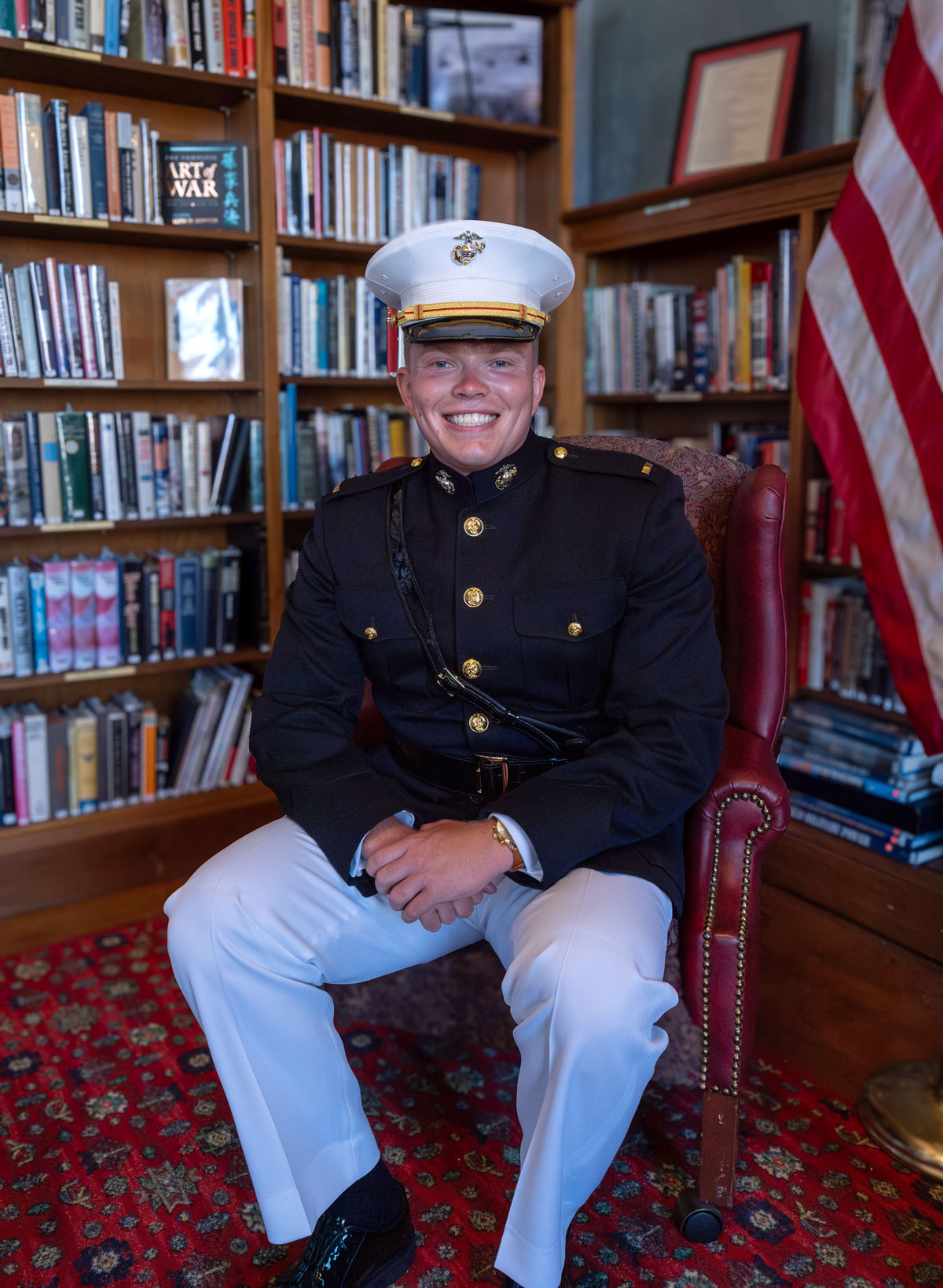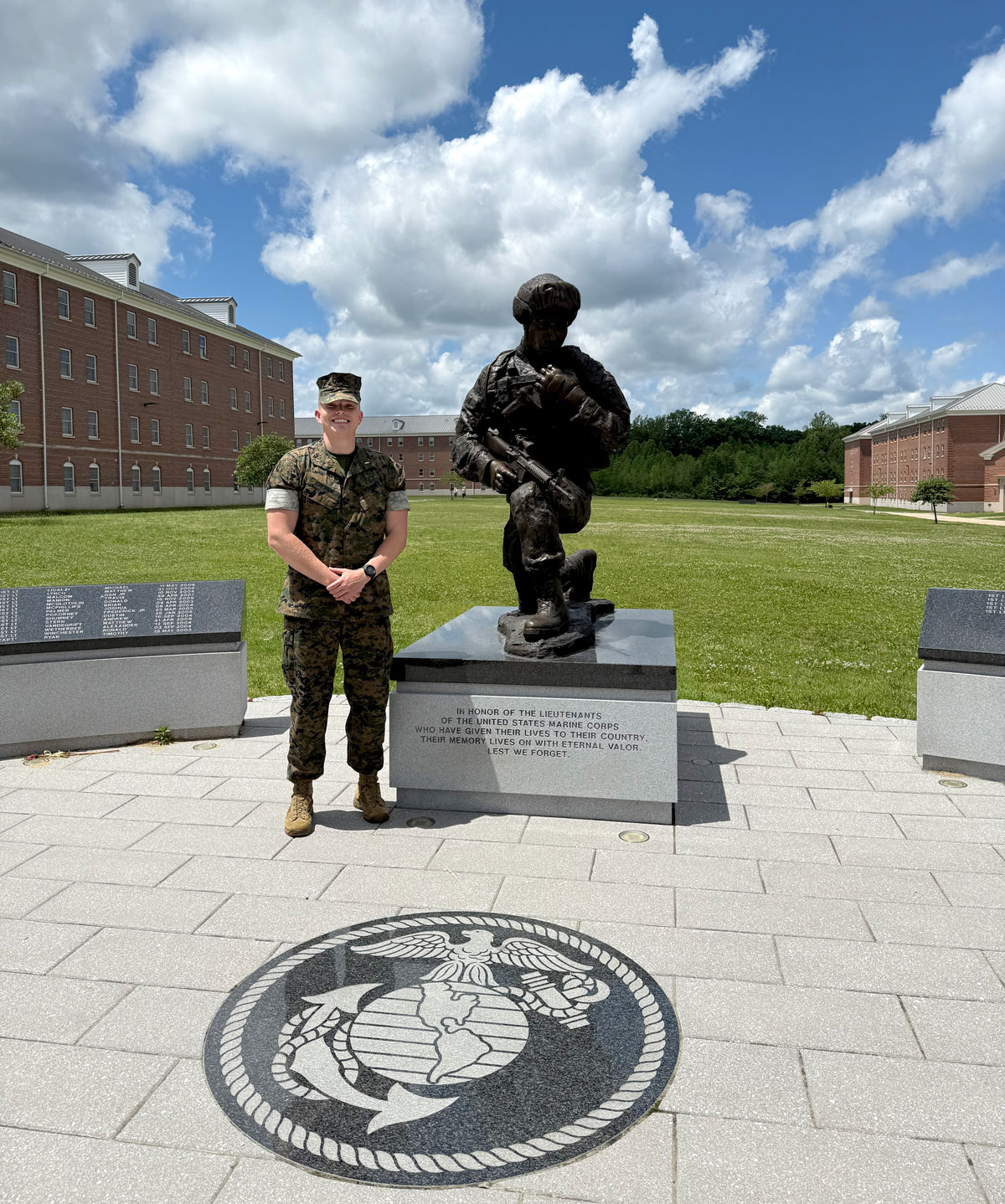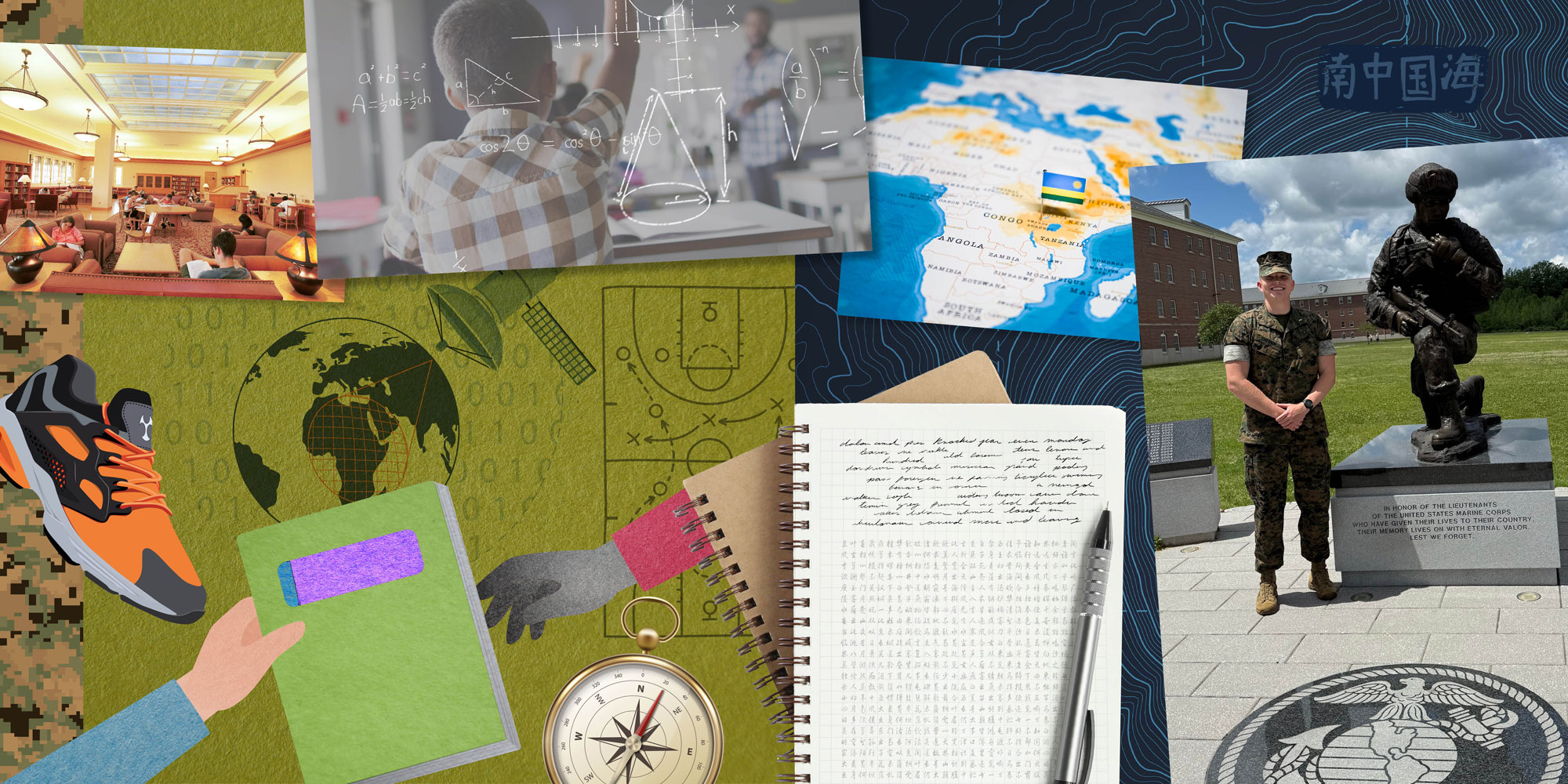Growing up, Graham Chernik, ’24, MA ’24, made two trips with his dad to an orphanage for boys in Kigali, Rwanda, where they spent time getting to know the kids, and Chernik alternated between offering math tutoring and playing basketball and soccer—or blocks—with the boys. In high school, he decided to start a fundraising organization for the orphanage, Rwandan Relief—and to bring a commitment to service into his adult life.
 Photo: Annabelle Fung
Photo: Annabelle Fung
He did not expect that commitment to come through the military. “Both my grandpas served—one in the peacetime Navy, and the other in the Korean war,” he says. “But other than that, I hadn’t really thought much about it.” That changed when he joined ROTC as a freshman. The scholarship, and liking a challenge, had been motivations to join; soon, he grew to cherish the life he led through the program, one distinct and apart from that of a college student.
Chernik majored in international relations. Under the supervision of Gen. H.R. McMaster, a senior fellow at the Hoover Institution and a former U.S. national security advisor, Chernik wrote biweekly reports on current events in Asia and Africa, focusing on Afghanistan, Sudan, and Ethiopia. He then studied abroad in Taiwan, where he learned Chinese through an ROTC language program. Back at Stanford, he wrote research papers on the geopolitical situation in the South China Sea, as well as the potential defense of Taiwan and its implications for neighboring countries. Through his master’s work in sociology, he deepened his knowledge of Northeast Asia and East Asia and began to better understand how the military weighs the interests of people at home and abroad. “To me, intelligence in the military was the best way to fuse what I was interested in, in a more professional space.”
In May, Chernik graduated from the Basic School, in Quantico, Va., a six- or seven-month course that prepares every new lieutenant in the U.S. Marines with the basics of being a Marine officer before moving into a specialized role. Now he’s furthering his lieutenant training in tactics and leadership. He hopes to be stationed overseas—possibly in Japan—and to one day continue his policy work in East Asia.
STANFORD: What inspired you to pursue a career in the Marine Corps?
Chernik: Going into senior year of high school, I really wanted to see how I could best challenge myself. I was applying to top schools like Stanford, but I was also always physically inclined in terms of sports or working out, and the military piqued my interest. To me, it really just posed a big challenge and a fruitful pathway to giving back to my country. I’ve always been very service-oriented, and volunteering had always been a really big part of my life.
Once I started ROTC at Stanford, I fell in love with the mission and purpose of the Marine Corps. To me, the Marine Corps presents the most tight-knit and dedicated branch of the services, although all the different branches contribute to an equally important mission. But it wasn’t really the community at Stanford that drew me in. It was being able to have an almost separate experience at Stanford that meant a lot for my livelihood outside of Stanford. I was very appreciative that I could balance that liberal arts education, and do something that I was increasingly passionate about, which was military and civil service.
What is the Basic School like?
The idea is that you come out of the Basic School [TBS] being able to understand what it’s like to be a rifle platoon commander but also understanding how the Marine Corps interacts with the different branches within the Department of Defense. Then you’re ready to go on to follow-on school for your specific job—your Military Occupational Specialty [MOS]—whether it’s infantry, intelligence, communications, or even finance.
Day-to-day it is very similar to what a year of college would be if your degree was being a Marine Corps officer. We have academic tests, leadership evaluations, and guest speakers. We live in barracks—my barrack room kind of looks like a room in [a grad student apartment but] 40 years ago—take classes, and go out to the field, where we learn offensive and defensive operations patrolling. You’re out in the woods or a mock city, sometimes in tough conditions. We had one field exercise in January, following a blizzard, and the average temperature was 10 degrees for the entire week. Being able to push your body to the limits in those conditions without proper gear, outside of maybe a couple of warming layers, is pretty cool. It’s pretty motivating.
It is also really interesting coming from a Stanford background and interacting with people from all different walks of life. I knew I would have the opportunity to do this at TBS, but the scale of it is really interesting because we’re all learning the same material but we’re all using a different foundation to react to situations. I think that’s a really cool aspect of the military in general. At the end of the day, it doesn’t really matter where you came from, as long as you leverage it in a positive manner to inform your leadership.
How do you see your future in the Marine Corps?
Right now, I have a set commitment to the Marine Corps: four years of active-duty service, and then four years of individual-ready reserve service, which means you could be called back into active duty should you be needed. So, for me, that means after MOS I’ll be leading a platoon for three years or so. And then at the end of that time I’ll decide if I want to stay in the Marine Corps or transition into civilian life.
I would definitely make a career out of the Marine Corps because there are so many opportunities available as I progress through the military, from advanced degrees to policy work in Washington, D.C. I’ve always been a huge fan of seeking out leadership roles, whether it’s captaining my basketball team or volunteering, or even having leadership roles on campus at Stanford. So, if I’m still able to do that I’ll happily re-up and continue to lead Marines because that seems like definitely the most rewarding thing for me to do right now.
What advice would you give someone interested in the military or public service?
First, know that it’s what you want to do. I knew that I wanted a challenge and to be able to lead. It worked out that I ended up falling in love with the mission and the purpose of the Marine Corps, and that I’ve been performing well enough to stay in the organization and commission as an officer.
 Photo: Courtesy Graham Chernik
Photo: Courtesy Graham Chernik
But something that I’ve learned is that your mistakes, or what you fail to do as an officer, will ultimately be measured in the lives of the Marines you lead. So, know for a fact that’s what you want to do, because it is a commitment. It is going to be taxing, but if it’s something you commit to, it is going to be fulfilling.
Second, stay true to your own moral and ethical compass, whether it’s in the military or [in] different public service commitments. The Marine Corps has core values of honor, courage, and commitment, but each individual also has their own set of morals and ethics that they can’t deviate from. It’s important to establish that early on before you join a career in public service. Things aren’t going to always go your way, because of bureaucracy or current events, or your assigned billet or responsibility. As long as you stay true to your internal purpose and mission, then what you’re doing will still be fulfilling.
Finally, coming out of Stanford, it’s easy to get complacent because a lot of opportunities are at your fingertips. There’s a lot of things you can do. But if you have ambition and know what you really care about and how you want to challenge yourself, then you can definitely find a career in public service. The military might not be the most glamorous [career], but it’s definitely going to be one that you remember, and people remember you for. So, consider harnessing that ambition for something positive in terms of giving back to a community, and serving and protecting your community.
What else would you like to share?
I think a lot about how wide and enduring the Stanford connection and ecosystem is across generations, career paths, and country. My dad, Eric, went to Stanford and graduated in 1987, then co-termed in 1988. This weekend he was in D.C., and we went out with my Stanford friends that live in D.C., and his Stanford friends that live in D.C. from his freshman dorm. He lived in Trancos about 40 years ago, and it was super cool to drop names of Stanford professors, classes, and programs that I engaged with, and see how many they knew and had engaged with too. So just remembering how that community is powerful.
Zora Hudson, ’24, is a former editorial intern at Stanford. Email her at stanford.magazine@stanford.edu.



